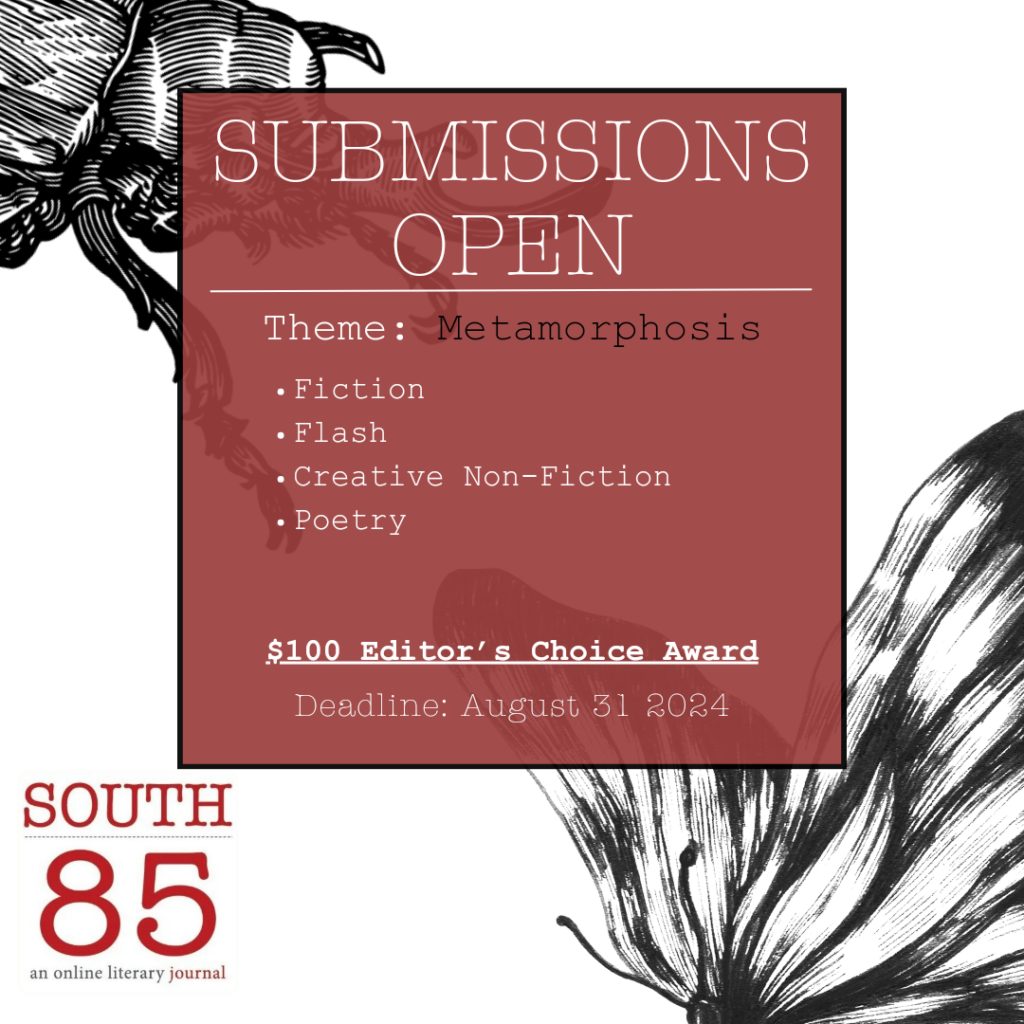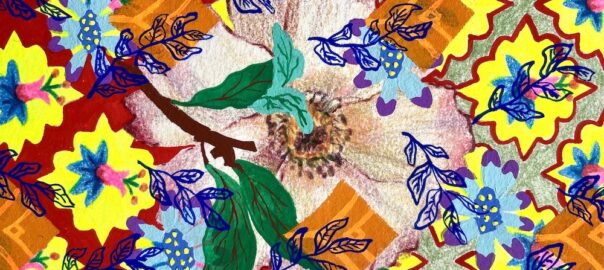
We’re Eager to Read Your Work!




*Featured Image by Lauren Peterson
Greenville, South Carolina, January 20, 2009
Maybe a seven-minute ride. Turns out
a lot of us white guys are here today,
pickups mostly, stuck with American flags
like Band-Aids over bumpers, back windows,
in honor of the history behind us.
Hauling two months of litter and beer bottles
from my blue luxury sedan, I must
appear to be a lost investment banker
hiding the bender he’s still getting over.
The guy beneath the HERITAGE NOT HATE
cap smiles. “Looks like you had yourself a time.”
He smells like he’s biodegradable.
I toss Buds into the dumpster, one by one,
so he’ll gimp off before my box is empty.
It works. It’s only me, as I repop
my trunk, and drag bag to the garbage bays
to fortify the artificial hill.
Mission Accomplished. Although I’ll be back,
sooner or later, with another load
of crap my cat and I want to be rid of,
filling what cavities our land still holds.
Gilbert Allen lives in Travelers Rest, SC, from where he frequently proceeds south (and north) on I-85. He’s the author of five collections of poems, including Driving to Distraction (Orchises, 2003), which was featured on The Writer’s Almanac and Verse Daily. Since 1977 he’s taught at Furman University, where he’s currently the Bennette E. Geer Professor of Literature.blog
Reservation dogs
of uncertain breed
sleep in the gas
station parking lot.
A stiff hot wind
blows empty packs
of Camels, Hershey
bar wrappers, and
an empty Coors can
across the rippling tar.
Low, flat-bottomed
cumulous clouds rest
on the sky’s glass pane,
reflecting the red sands
of the desert below.
To the south, ancient
stone cities stand atop
narrow bluffs and solid
mesas. Old priests with
parrot feather staffs
celebrate deep, dusty
time in secret kivas.
Every day is a god,
each star a prayer.
While here at the station,
the register dials up the
cost in digital numbers –
99 cent Coke, three
dollars in corn chips,
and twenty-five in
gasoline – the smell
of colonial commerce.
 John Nizalowski is the author of four books: the multi-genre work Hooking the Sun; two poetry collections, The Last Matinée and East of Kayenta; and Land of Cinnamon Sun, a volume of essays. Nizalowski has also published widely in literary journals, most notably Under the Sun, Weber Studies, Puerto del Sol, Slab, Measure, Digital Americana, and Blue Mesa Review. Currently, he teaches creative writing, composition, and mythology at Colorado Mesa University.
John Nizalowski is the author of four books: the multi-genre work Hooking the Sun; two poetry collections, The Last Matinée and East of Kayenta; and Land of Cinnamon Sun, a volume of essays. Nizalowski has also published widely in literary journals, most notably Under the Sun, Weber Studies, Puerto del Sol, Slab, Measure, Digital Americana, and Blue Mesa Review. Currently, he teaches creative writing, composition, and mythology at Colorado Mesa University.
The postman leaves a cage of babies,
angry ones who rattle, buzz, and hum,
babies who are hungry, who kick segmented legs
through the open spaces in a metal screen.
I feed them generous blasts of sweetwater
from a spray bottle, I mother them. I shake them
out of a hole in the shipping box and into
the hive I’ve made. Within weeks,
the foragers are already teenagers
wearing orange, pink, and white
from the yard’s blooms. As I lean in close
to watch them leave the hive and return with
nectar and pollen, one of them passes too close,
entangles herself in my hair. I feel her wings
against my scalp, legs tugging fine strands,
the painful knot of us—mother and child.
 Lynn Marie Houston holds a Ph.D. from Arizona State University. Her first collection of poetry, The Clever Dream of Man (Aldrich Press 2015), won the 2016 Connecticut Press Club prize for creative work and went on to take 2nd place in the nationwide competition sponsored by the National Federation of Press Women. Poems and essays by her have appeared in journals such as Painted Bride Quarterly, Ocean State Review, Word Riot, Squalorly, and many others.
Lynn Marie Houston holds a Ph.D. from Arizona State University. Her first collection of poetry, The Clever Dream of Man (Aldrich Press 2015), won the 2016 Connecticut Press Club prize for creative work and went on to take 2nd place in the nationwide competition sponsored by the National Federation of Press Women. Poems and essays by her have appeared in journals such as Painted Bride Quarterly, Ocean State Review, Word Riot, Squalorly, and many others.
When I give him that look, he asks why I think it’s weird for him to rap along with the radio. He looks back at his game on the TV as I shake my head, place my hand on his shoulder. We were the first in school to begin to grow beards. We will order pizza with halal pepperoni; he will ask about my mother, what it was like for her to re-marry. My mother has not made Arabic food since she converted and met her husband at church. His mother rolls grape leaves on the front porch, wet like his gelled hair. She whispers to the neighbors. When he asks his questions, he stares into the hybridity in my arteries. I stare at the hair on his arms, compare the tight curls on my head, the curve of his nose.
 Marlin M. Jenkins was born and raised in Detroit, graduated from Saginaw Valley State University in Michigan, and will be attending University of Michigan’s MFA program this fall. His writings have found homes in River Styx, Yemassee, and Midwestern Gothic, among others. You can find him online at marlinmjenkins.tumblr.com and @Marlin_Poet.
Marlin M. Jenkins was born and raised in Detroit, graduated from Saginaw Valley State University in Michigan, and will be attending University of Michigan’s MFA program this fall. His writings have found homes in River Styx, Yemassee, and Midwestern Gothic, among others. You can find him online at marlinmjenkins.tumblr.com and @Marlin_Poet.
I hated my mother sometimes
as all good girls do,
because there were too many
pairs of unused shoes
in her closet, hoarded there,
a heart beating only for itself.
But how could love be measured
by the amount of dust falling
on thirteen pairs of red shoes,
I chided myself.
I loved my mother,
most of the time,
remembering we both breathe
the same early morning air
with such relish,
before worrying over
the weather the day might bring,
this as all farm women
in my family are apt to do.
And apt to stare into the mirror,
where my skin has taken on the
texture of dried leather,
like that single pair of shoes
left in the garden,
untended, splitting open.
And apt to exaggerate
the count of shoes
and the texture of memory,
gaps where the past should be,
that oblique place
I cannot quite describe,
except to say it was small,
cramped with the clutter
of at least a hundred high heels
and no clear faces.
 Mary Catherine Harper, a Southwest Kansas drylands native, lives at the confluence of the Auglaize and Maumee in Ohio. She organizes the annual SwampFire Retreat for artists and writers in Angola, Indiana, and has poems in The Comstock Review, Cold Mountain Review, Old Northwest Review, Pudding Magazine, SLAB, MidAmerica, and New England Review. Her “Muddy World” won the 2013 Gwendolyn Brooks Poetry Prize, and her chapbook, Some Gods Don’t Need Saints, was recently published.
Mary Catherine Harper, a Southwest Kansas drylands native, lives at the confluence of the Auglaize and Maumee in Ohio. She organizes the annual SwampFire Retreat for artists and writers in Angola, Indiana, and has poems in The Comstock Review, Cold Mountain Review, Old Northwest Review, Pudding Magazine, SLAB, MidAmerica, and New England Review. Her “Muddy World” won the 2013 Gwendolyn Brooks Poetry Prize, and her chapbook, Some Gods Don’t Need Saints, was recently published.
by Brit Graham
Why is death
rarely a woman?
Eyes rend and tear.
Mouths gape, jaws have forgotten
their function. Idolized
is she, amongst the strobing lights
and fluorescent bulbs.
But, we’re rarely pretty when
stripped of our hearts, when
the camera shifts below
our hips, when flesh and jaw
dangle, longingly attached
to their former structure.
She’s shucking her glossed
leather gloves, flicking light
from shadow. She’s tugging
each gloved finger, peeling back
it’s black casing, a second
skin. Her sash blinds
in the stuttering lights, freed
from its bindings. Her hips
dip and roll in their easy crash
and saunter of angst-laced bass.
The precise pitch a perfect fever
to settle deep in the bones.
Glacial heels slam and crack
against the stage, her glove
drifts to the floor.
Why is death never a woman?
Why is she only aching
when she creates a life
for you? This body half loved
by you, this body spinning
a new life for you and
loving it more because that
budding body is half of you
too. Why is does she ache while
she’s creates a body
to sustain you?
Her robe parts, a scar
cleaves her soft belly
in two. The hood
of her robe, peaked over
her brow sheathes
pitted sockets and mangled
maw. Scuffed heels pierce
the sleek pedestal in which
she was raised. Her ease
fractures with rigor
mortis, her gentle serial
suicides laid as stepping
stones for the ferrying.
Her hood falls, long locks
moth eaten, much like
the webs she’s weaved.
The lies piled upon curled
silk, spun from ashes
and grief.
Why is she
not our harbinger
of death? The androgynous
shape the same
as any cut
from the stripped
fineries of living.
—
 For now Brit Graham traverses the tundra that is South Dakota, while tripping over things while stargazing in the all too brief summer months. She is the crux of an ongoing love affair between the Pacific and Atlantic. She managed to pry an MFA in Poetry from the grasp of Converse College. You can read her poetry things in publications like Devilfish Review, The Night Owl, RealSouth Magazine, and The OWL.
For now Brit Graham traverses the tundra that is South Dakota, while tripping over things while stargazing in the all too brief summer months. She is the crux of an ongoing love affair between the Pacific and Atlantic. She managed to pry an MFA in Poetry from the grasp of Converse College. You can read her poetry things in publications like Devilfish Review, The Night Owl, RealSouth Magazine, and The OWL.
It is tempting not to speak.
Rather, to breathe in cold catacombs
with eyes wide open.
I think I understand the way you hope.
In your mind, above, crisped spring:
white plum blossoms
icing up saplings. Belief is like this, getting
carried away by progress.
I cannot believe in history.
Still, the fisted buds flare
into wicks burning atop stone-
cold facades tipping deeper into silence.
Michelle Matthees lives and writes in Duluth, Minnesota. She is a graduate of the University of Minnesota’s MFA program in Creative Writing. Recent work of Michelle’s can be found in PANK, The Prose Poem Project, Cider Press Review, 22 Magazine, Proof, Memorious, Anderbo, Defenestrationism, 5 Quarterly, Humber Pie, Specs, Third Wednesday, Paradise Review, The Mom Egg, Sou’wester, Thrice Fiction, and elsewhere.